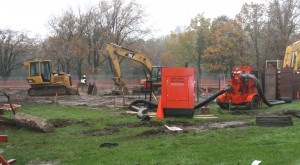
Drue Sokol - Photo Editor
For most undergraduate students, this is the point of the semester when sleep is a precious and much-needed commodity.
But students living in Anderson and Wilder Towers say they are losing sleep for a reason they might not have expected coming into the semester: construction on the new residence hall in Founders’ Court, which began in early October.
Numerous Towers residents are vocally complaining about the noise and lack of adequate notifications from administration. Some have gone so far as to propose that Towers residents be compensated for the inconveniences of living with the noise, dust and roadblocks.
Director of Residential Life and Housing Services Laurel Contomanolis said that compensation is strictly a rumor and is not being considered at this time. She also said that ResLife has not received “an overwhelming amount of complaints” and is addressing concerns to the best of its ability.
“We are being inconvenienced by all of this construction, and it has become a terrible living situation,” sophomore Farrell Cooke said. “I wanted to potentially be reimbursed for living expenses, since it’s not 100 percent livable.”
Cooke acknowledged that this compensation might not be a feasible idea and said giving residents an extra point in the housing lottery would be a workable solution.
Cooke said construction trucks wake her up at 6:30 a.m. nearly every morning and that it is inconvenient to get into Anderson because the construction is blocking the Wilson Boulevard entrance. She said she has written to ResLife about her complaints, but “nothing was really done in response to the email.”
“Studying in the suite has become impossible because no one can concentrate with all of the noise outside,” she said. “We can’t keep our windows open because of the dust and noise, which is annoying. We shouldn’t have to do that.”
Cooke said that the earplugs made available to students by Towers Hall Council this week are an inadequate solution.
“I don’t know anyone who is going to wear earplugs for the seven plus hours that they are doing construction and pile driving,” she said.
Contomanolis said that the pile driving, a repetitive process required to construct the foundation, is likely to be completed by Monday, Oct. 31 and that this first phase of the project will be the noisiest. Once the pile driving is complete, noise will substantially decrease, she said.
“[The noise] will most likely be mitigated by the fact that the colder weather will encourage students to close their windows,” she said. “It won’t be perfect, but I am confident that it won’t be as intrusive.”
She also said that the Towers Area Coordinator has been sending out information to the Towers community “routinely from the start of the year” to explain the situation.
Contomanolis said that students were notified over the summer about the construction, though she said the communication portrayed the new building more as an “exciting new opportunity” rather than a warning of potential inconveniences.
She said students suggested alternating 8 a.m. start times with 11 a.m. start times, but decided this was not a viable solution because it would prolong the pile driving for another two days.
ResLife also received the suggestion to move students to other rooms on campus or to hotels during the loudest phases of the construction, but Contomonolis said this is not feasible because UR is at over 100 percent occupancy and has no other room options.
“We’ve restricted the noise to between 8 a.m. and 5 p.m.,” she said. “While not ideal student times, they are certainly workable for a few days.”
Student opinions suggest otherwise.
“We have dust in our room, and I’m allergic to dust,” said sophomore Nicole Zizzi, who lives on the fifth floor of Anderson. She added that she is woken up by the noise before 7:30 a.m. every morning.
Zizzi said that if she had known about the construction during room draw last April, she would not have decided to live in Towers.
“I think we should be compensated,” she said.
Anderson resident and sophomore Jana Hillenbrand said she is often woken up an hour early and that the pile driving is “really disruptive” and has made it impossible for her to study in her room.
“I think we deserve some sort of compensation,” she agreed.
Other students, who are earlier risers, say they have been less impacted by the construction.
“It’s annoying, but I have to get up early anyway because I have 9 a.m. classes most days,” sophomore Dena Rothman, who lives on the third floor of Anderson, said.
Rothman said she did not think ResLife should “do anything drastic like reducing the housing payment,” but that compensation such as a half point more in the housing lottery would be a suitable solution.
Sophomore Naoufal Zouak, a resident of Wilder Tower, also said he has not been impacted by the noise or woken up in the morning. He said his suitemates have closed their windows and have not been bothered, and added that he was surprised that students were discussing compensation.
“For me personally, it’s not a big issue,” junior Bryan Knouse, who lives on the first floor of Wilder, said. “I could see how others want to be compensated, especially because of the repetitive pile driving, but I’m up for class at 8 a.m. anyway, and I’m not around much because of my schedule this semester.”
Contomanolis stressed that UR is building the new residence hall because of the dire need for more housing.
“The ultimate outcome is very positive as it provides 148 additional student housing beds that we desperately need,” she said.
Buletti is a member of the class of 2013.


